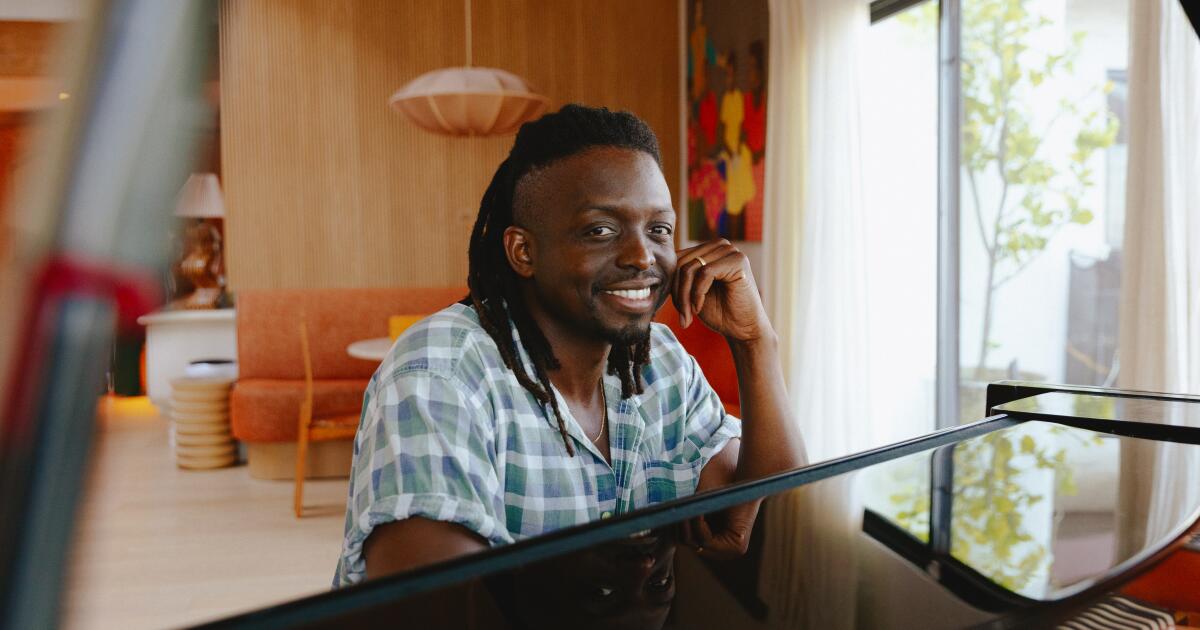Jonathan Singletary is almost ready to go live on Instagram. He scans his short-sleeve button-up — it’s clean and different from the one he wore last time. He takes a few deep breaths. He throws up a quick thank-you to God, opens Instagram, hits the white circle and goes live at 5:30 p.m. People from across the country begin to tune in for improvised music in a welcoming spiritual space. It’s time for “Piano & Prayer.”
The late afternoon Los Angeles sunlight shines through gauzy curtains behind Singletary, who sits at his piano with fingers poised over the keys. The music starts. On Instagram, members of the “Piano & Prayer” community greet one another and share where they are listening from: Atlanta, Pittsburgh, Houston, New York City, Maine, Rhode Island, New Jersey and even Chile.
Jonathan Singletary connects with new people and longtimers during his “Piano & Prayer” sessions.
(Amanda Villarosa / For The Times)
Singletary riffs with the confidence of a musician who began playing a toy piano at the age of 5 in his family home in Nashua, New Hampshire. Now, a 38-year-old father of two, he starts vocalizing as he plays, sometimes forming words, but always in a soothing harmony.
During the early days of the pandemic, from his living room in New York, Singletary started “Piano & Prayer,” a weekly spiritual, but not necessarily religious gathering, for people to connect and share. For him, it was the perfect antidote to the isolation he was feeling.
“Hello, hello, welcome to ‘Piano & Prayer.’ Happy Monday,” Singletary says. He stops playing and turns toward the camera with a warm, welcoming smile.
Singletary’s eyes light up. “Jaden, good to see you, my mom’s in here, so many familiar faces, Hannah, good to see you, Aunt Jeanette, good to see you. I missed y’all, I missed this.” Singletary and his family had been on vacation for a couple of weeks, and he’s excited to be back. “Debra, good to see you.”
Debra Mazer, a “Piano & Prayer” original, is watching from Atlanta. “ I had Jonathan’s sessions on my pandemic roster . I had a schedule for myself that I put in the calendar because the Zoom groups were very important to my mental health and well-being,” Mazer says. She discovered this gathering by following Singletary’s then-financée, now wife, Elaine Welteroth, former editor in chief of Teen Vogue.
It was a tough time to be a professional musician in April 2020. “ I made music. I’ve done a lot of shows, but all of that was shut down,” Singletary says. He credits Welteroth with encouraging him to combine social media with music. He remembers her saying, “ Go on in there and just play, just play some music.”
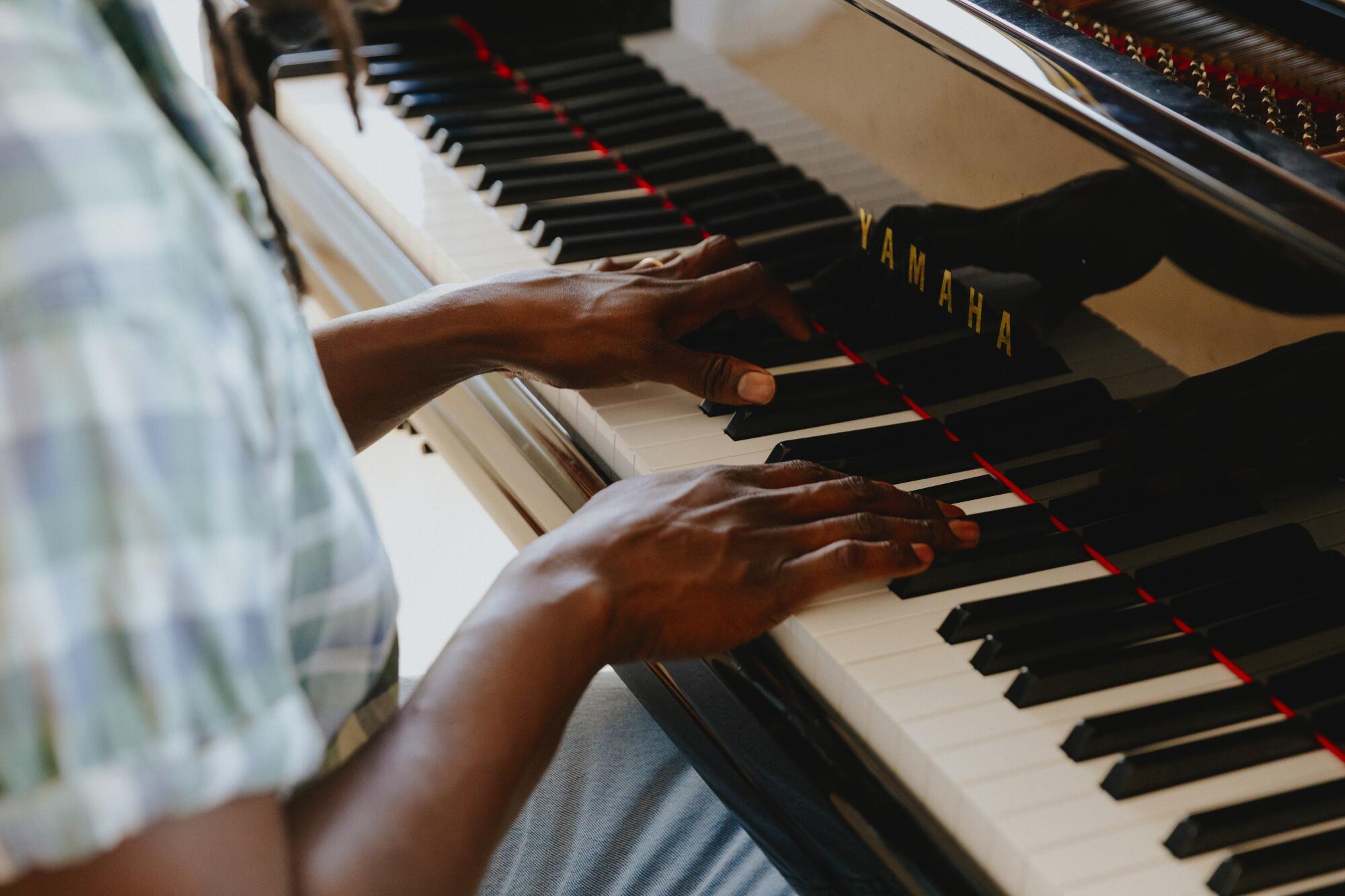
Jonathan Singletary played music at New York venues before the pandemic, but once stay-at-home orders were in place, he needed another outlet: Enter “Piano & Prayer.”
(Amanda Villarosa / For The Times)
Singletary confesses it was a bumpy start. The first iteration was him playing acoustic versions of his songs: “I t didn’t fully resonate with me.” So he returned to his first instrument, the piano. “Piano & Prayer” wasn’t set up to be a moneymaking endeavor at first, but Singletary recently launched a Patreon, which allows creators to collect money directly from fans.
“ I was always playing piano for fun. I would go into the chapel at my Catholic high school, and I would play piano, and my friends would come in and lie on the floor and just zen out while I played,” he remembers. “This thing [“Piano & Prayer”] has existed for a while.”
Fast forward to 2020, instead of a chapel floor, isolated people from across the country carved out 45 minutes to connect. Mazer notes that while the world has moved on from COVID, “Piano & Prayer” is one of the online activities she started during the pandemic that she still attends regularly.
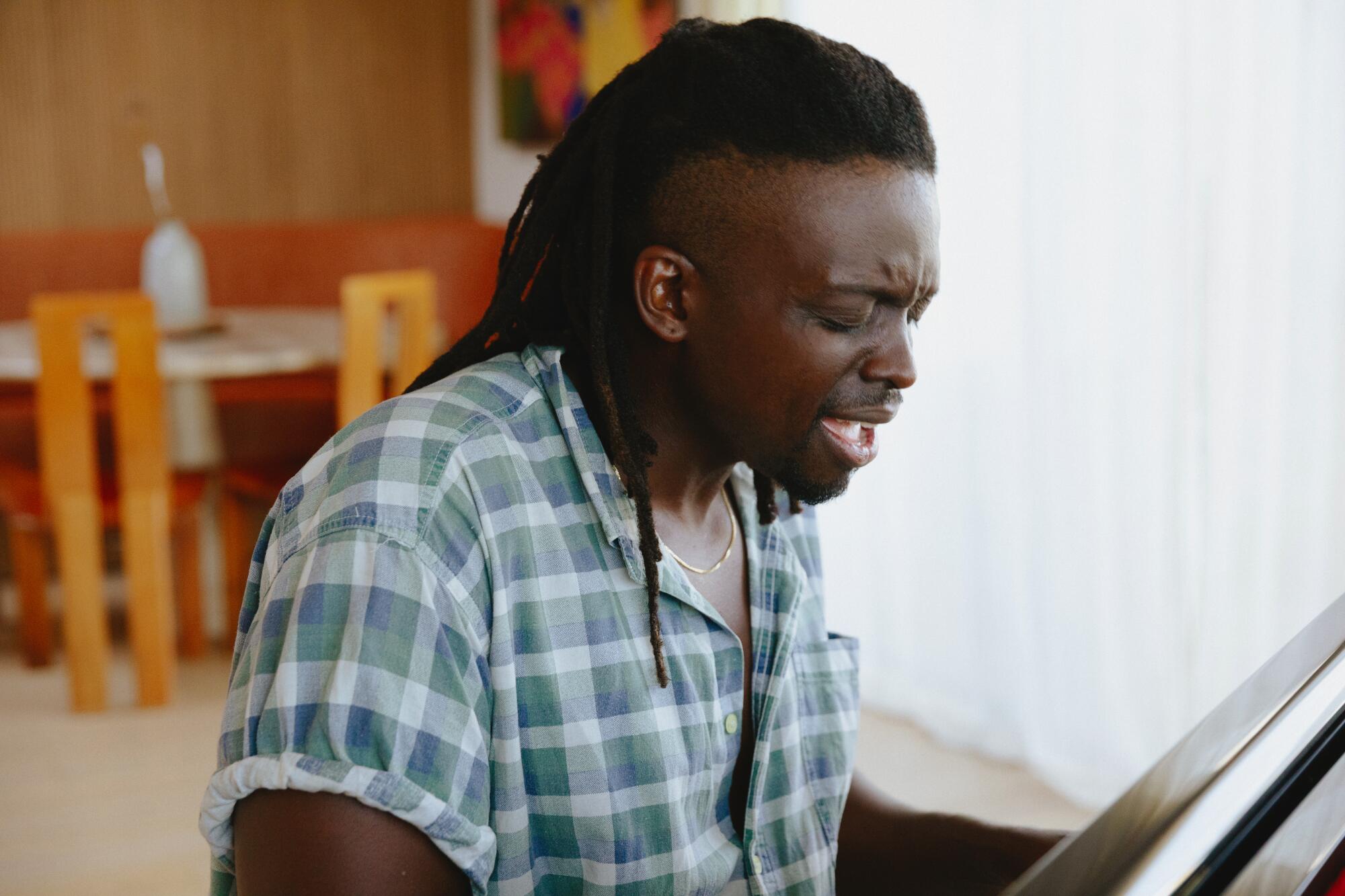
Jonathan Singletary riffs while playing during his Instagram sessions, sometimes just vocalizing as viewers share their prayers in the comments.
(Amanda Villarosa / For The Times)
The Monday evening sessions are a blend of gentle piano music, meditation, prayer and community. During a recent livestream, 40 people gathered — those who want to share what they are thinking and feeling in the chat, offering prayers for themselves and others.
“For those affected by the flooding in TX,” one person shares.
“Praying for my students that they make up their work this summer session and pass to graduate,” someone types.
“Praying for the families in Texas. Lord, have mercy,” pops up.
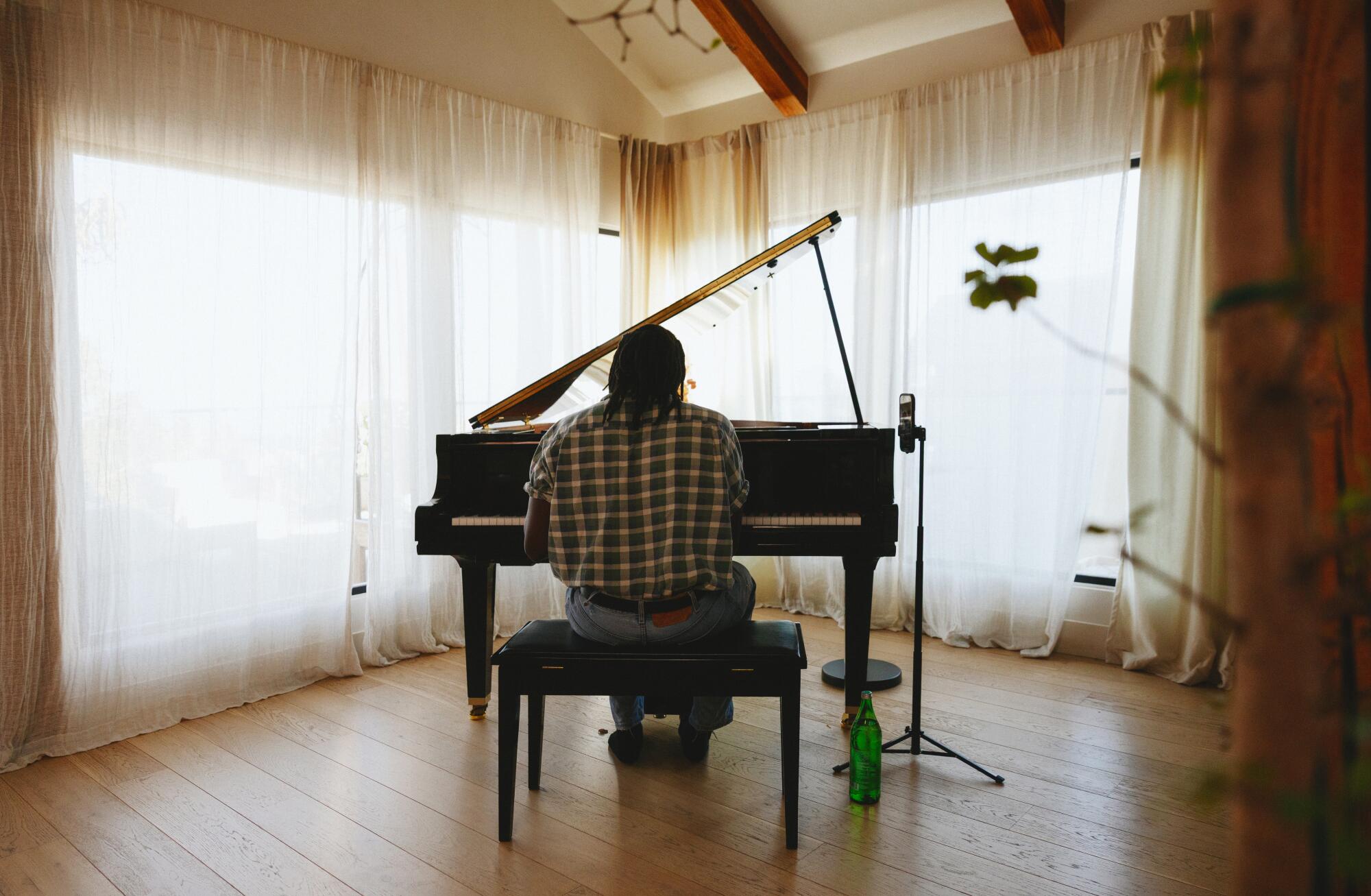
Jonathan Singletary plays the piano in a corner of his home.
(Amanda Villarosa / For The Times)
Singletary adopts a friendly approach, meeting people where they are with their religiosity or spirituality. Never preachy or too churchy — sometimes God is never mentioned. He was raised in a churchgoing family. “The church was a huge part. Has been a huge part of my life for as long as I can remember.”
For Singletary, the idea of going to church every Sunday changed during the pandemic. He didn’t feel safe, and then he moved to a new city and finding a new church was hard with social distancing.
On the other side of the country, it’s 8:30 p.m. and Bobby Brown’s four children, ages 5 to 12, are in bed. “Piano & Prayer” plays on his phone while Brown and his wife are hanging out in the humid night air. “ It’s just like a romantic thing in the background while we’re talking,” Brown explains.
“Then he [Singletary] throws out some prayers. We pause and take some deep breaths, because he tells us to and he reminds us to.”
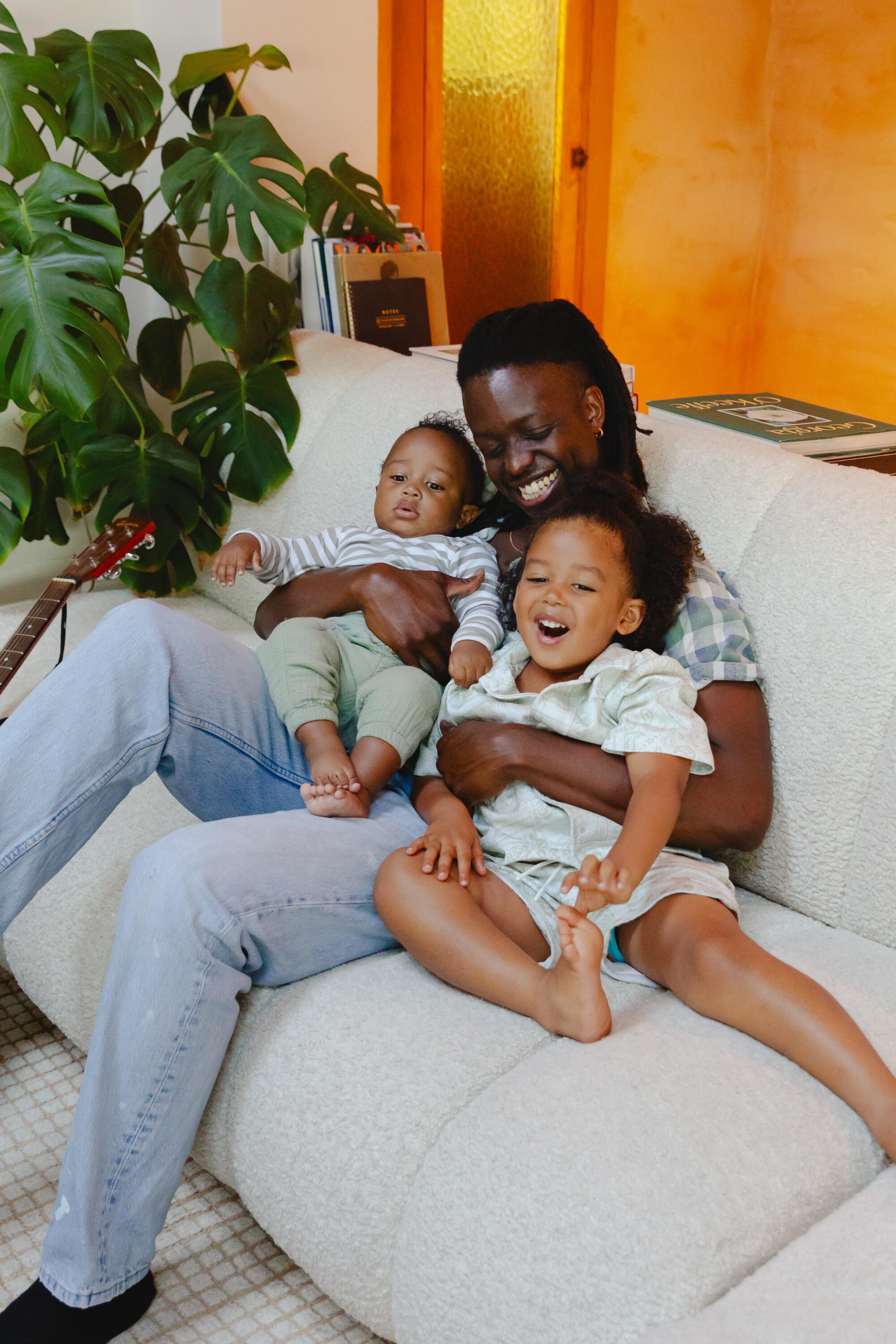
Jonathan Singletary, with his children.
(Amanda Villarosa / For The Times)
Before relocating to Atlanta, Brown lived in Inglewood. He runs a nonprofit group called Donuts For Dads, a supportive community for fathers. This is where he and Singletary first connected. Brown says he didn’t realize his friend had this growing online community.
“ He doesn’t even promote it. It was just like, ‘Hey, I’m going live, ’” Brown laughs. “Whenever I see any of my friends go live, I just click to support them. Even if I can only hop on for a couple of minutes, try to throw some hearts in there.”
Both Mazer and Brown could be considered part of a larger trend of individuals who identify as spiritual rather than religious. A 2023 Pew Research Center survey found that 41% of U.S. adults report having grown more spiritual throughout their lifetime, compared with only 13% who say they have become less spiritual.
This data makes sense to Sarah Wilkins-Laflamme, an associate professor in social studies and legal studies at the University of Waterloo in Ontario, Canada, where her area of expertise is the sociology of religion.
“ It’s like, no, religion’s not for me. But I like spirituality. All these shifts have happened across generations, especially amongst younger cohorts, the term religion itself now has almost a negative connotation in some contexts, but spirituality doesn’t.”
Singletary, who has about 25,000 followers, publishes the Instagram Lives on his grid and says the views on each “Piano & Prayer” session are usually around 1,000, but have reached as high as 5,000.
“This isn’t about people watching me do a thing. The most touching to me and maybe validating as well, is that I see people engaging with each other and encouraging each other and praying for one another and responding to each other’s prayer requests.”
For the moment, if it’s a Monday at 5:30 p.m., you can find Singletary at his black lacquered piano ready to welcome anyone who needs it into the “Piano & Prayer” family.
This story originally appeared on LA Times

